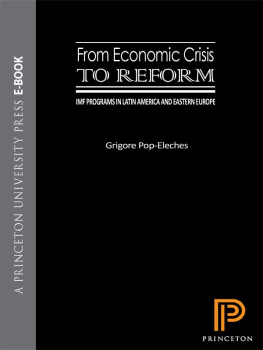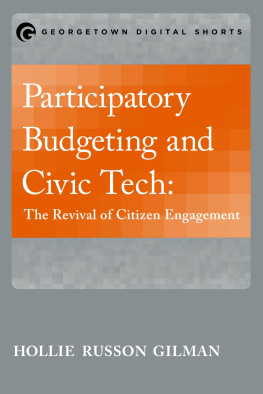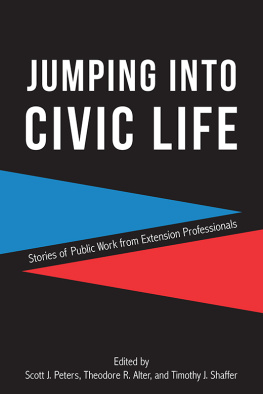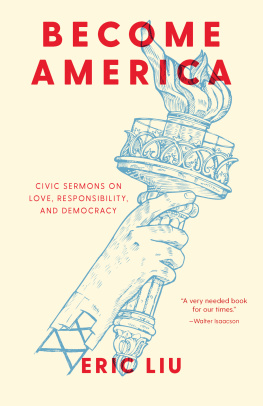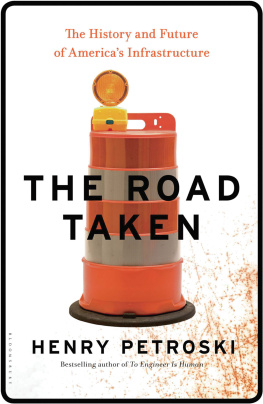REBUILD AMERICA
More praise for Rebuild America: Solving the Economic Crisis Through Civic Works
Rebuild America provides a concise and persuasive argument for new civic works initiatives to address problems that existed in the U.S. Gulf Coast before Hurricane Katrina devastated New Orleans as well as strategies to address lingering poverty and unemployment problems among African Americans and other people of color.
Robert D. Bullard, author of Dumping in Dixie
Scott Myers-Lipton has created a must-read book for all those interested in our nations economic recovery through job creation. It is a most engaging documentation of how a professor and his students became the can do kids, forging ahead with a plan for the development and passage of a bill to put America and the Gulf Coast back to work. This is a great book.
Beverly Wright, Founder and Director, Deep South Center for Environmental Justice
REBUILD AMERICA
SOLVING THE ECONOMIC CRISIS THROUGH CIVIC WORKS
SCOTT MYERS-LIPTON
First published 2009 by Paradigm Publishers
Published 2016 by Routledge
2 Park Square, Milton Park, Abingdon, Oxon OX14 4RN
711 Third Avenue, New York, NY 10017, USA
Routledge is an imprint of the Taylor & Francis Group, an informa business
Copyright 2009, Taylor & Francis.
All rights reserved. No part of this book may be reprinted or reproduced or utilised in any form or by any electronic, mechanical, or other means, now known or hereafter invented, including photocopying and recording, or in any information storage or retrieval system, without permission in writing from the publishers.
Notice:
Product or corporate names may be trademarks or registered trademarks, and are used only for identification and explanation without intent to infringe.
Library of Congress Cataloging-in-Publication Data
Myers-Lipton, Scott J.
Rebuild America : solving the economic crisis through civic works / Scott
Myers-Lipton.
p. cm.
Includes bibliographical references and index.
ISBN 978-1-59451-721-1 (hbk. : alk. paper) ISBN 978-1-59451-722-8 (pbk.:
alk. paper)
1. Public service employmentUnited
States. 2. Manpower policyUnited States. 3. Public worksSocial aspectsUnited States. I. Title.
HD5713.6.U54M94 2009
363.0973dc22
Designed and Typeset by Straight Creek Bookmakers.
ISBN 13: 978-1-59451-721-1 (hbk)
ISBN 13: 978-1-59451-722-8 (pbk)
To the people of the Gulf Coast, who have waited too long for a working infrastructure, good jobs, restoration of the social compact, the right to return, and dignity
CONTENTS
Jason Scott Smith,
Jeannette Gabriel,
Angela Glover Blackwell,
Emily Ryo,
David Bowman,
Julie Kuklinski,
Stephen Bradberry,
Jeffrey Buchanan,
Today, our nation faces great difficulties. Our economy is teetering on collapse. Large banks fail daily. Stock markets are volatile, falling 300 to 500 points in a day. In a recent poll, 60 percent of Americans feel the nation is headed toward a depression. Importantly, the American worker faced hardship even before the current economic meltdown. More than 10 million middle-class jobs have been shipped overseas since 1980. The gap between rich and poor has widened to record levels, middle-class incomes remain stagnant, and recent housing gains for African American families have been all but wiped out by the foreclosure crisis.
At the same time, our public infrastructure is crumbling. It can be seen in our structurally deficient bridges, weak levees, poorly maintained dams, and dilapidated schools. The impact of this public infrastructure crisis further endangers the economy and the quality of our life. If ports are clogged, roads are congested, and air traffic systems are outdated, then the American economy suffers, our quality of life is diminished, and public safety is threatened.
Our nation desperately needs a plan to create jobs that will bring relief to Main Street. Seventy-five years ago, when our country faced the crisis of the Depression, public works were offered as a way to provide good jobs at a time when there were too few, to improve and expand our infrastructure, and to provide common purpose based on people working together to uplift our nation. In less than two months, the Civil Works Administration (CWA) hired 4 million people, and during its five-month history the CWA built or repaired 200 swimming pools, 3,700 playgrounds, 40,000 schools, 250,000 miles of road, and 12 million feet of sewer pipe. It was a great ideaand it can work again.
Today, 200 faith-based, human rights, student, and community-based organizations are once again calling for public works as a solution to our economic crisis. But this time, it is under the banner of civic works, because the civic no longer seems to work for the average American. This inability of government to work for the people was most clearly demonstrated by the botched recovery in the Gulf Coast after Hurricanes Katrina and Rita. Not only were thousands of people left on their rooftops to fend for themselves, but also since then there has not been a comprehensive solution offered to rebuild an entire region of the country that was so badly damaged from one of the worst natural disasters in the nations history. The Gulf Coast still does not have adequate hospitals, housing, parks, or schools. The situation is so bad that in February 2008 two UN-appointed experts in housing and minority rights warned the United States that it was violating the human rights of African Americans and the poor in New Orleans by not providing affordable housing for its current and displaced residents.
The Gulf Coast Civic Works (GCCW) Act, which was introduced in Congress in 2007 after a campaign of persistent organizing, draws on a New Deal model for creating jobs and revitalizing infrastructure to rebuild the Gulfand it is gaining support from Gulf Coast residents, community leaders, and members of Congress from both parties. The bill would create 100,000 good jobs and training opportunities for local and displaced workers to rebuild public infrastructure and restore the environment. It would empower residents to return with dignity, revitalize the local workforce, and help create more sustainable communities. And if it works in the Gulf Coast, it can serve as a pilot program for national initiatives to solve similar problems across the entire country. If the GCCW Act is enacted, it will teach a new generation one of the best lessons of American history: When we rebuild public infrastructure, provide living-wage jobs, strengthen the middle class, and reduce poverty, we can make real the promise of e pluribus unumout of many, one.
This book is in many ways an extension of my first book, Social Solutions to Poverty: Americas Struggle to Build a Just Society. In that book, I highlighted and examined most every major social solution to poverty that has been put forward by grassroots activists and elite policy leaders since the founding of the country. All in all, that book presented more than forty different public policy initiatives.


